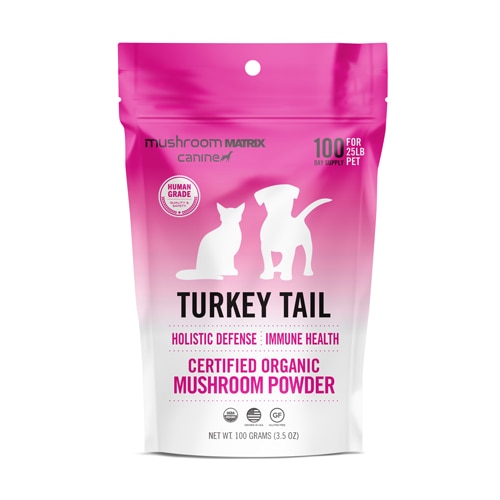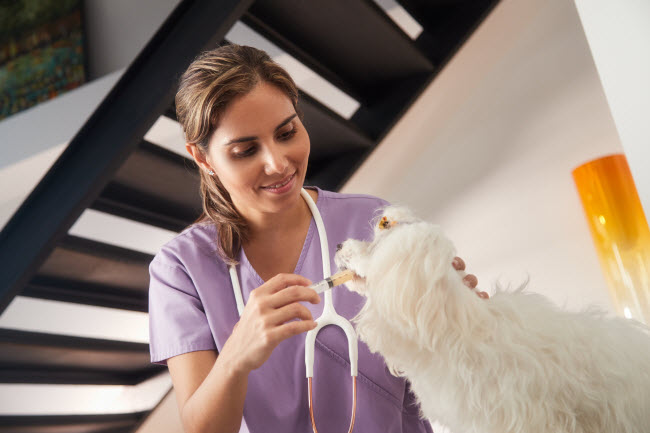With so many supplements on the market for your furry family members, it’s not always each to decipher why and when they might need one (or more). We talked with two vets to learn their takes on pet vitamins and supplements and what to know before starting your pet on a regimen.
Tips for giving your pet vitamins and supplements
1. Preventative care is key.
Most people begin to think about giving their pet supplements when they notice a change in behavior, such as a dog who’s not interested in running as often as he used to, or a cat who’s no longer jumping up on the bed as frequently as she was previously. Yet waiting until you notice an issue is the wrong approach, according to veterinarians.
“Supplements work best when started early,” says Rachel Neese, DVM with CityVet in Dallas. For example, about half of all dogs over age 4 have arthritis, she says, but they don’t generally see it clinically (i.e., people bringing them in for treatment) until dogs are much older. As such, “starting your pet on good, qualified supplements at an earlier age can help ward off some of the symptoms,” she notes.
Cats are often overlooked when it comes to supplements, but they can actually see many benefits from taking early joint-health supplements just like dogs. “Even though we don’t think about it, cats carry a lot of weight on small joints, so they can take arthritis supplements as well,” says Neese. “Start giving them at the first sign of slowing down; you’re not going to hurt them by starting too early.”
2. All supplements are not created equal.
So what makes a supplement good and qualified? “That’s the million-dollar question,” says Neese. Even human supplements are not yet regulated, though vets hope advancement in that area also carries over to pet supplements in the future. Neese recommends looking for supplements that are created by pharmaceutical pet companies, as they will be well established in terms of trial and data.
The good news is that vitamins, minerals and amino acids are covered by laws that require specific manufacturing processes for food, including safety and a guarantee that what is on the label is in the bottle, says Nancy Scanlan, DMV, executive director with American Holistic Veterinary Medical Foundation.
However, you should be wary of supplements with a price that seems too good to be true, because it probably is. “Cheaper ones that tend to be available mainstream probably won’t hurt your pet, but they may not have the ingredients they say they do,” says Neese.
One common supplement this affects often is glucosamine, used to support joint health. Many contain the human formulation of glucosamine, says Neese, yet dogs absorb it differently than humans—so the supplement may be ineffective in dogs, and essentially be a waste of money.
3. Certain breeds may need them more than others.
Large-breed dogs tend to get the most benefit from supplements targeting their joint health, because they often have earlier onset arthritis and more arthritic issues as they get older, says Neese. In addition, she says, dogs that are boarded often, go to “day play,” experience frequent change of scenery or are prone to getting stressed out can also benefit from probiotics to help regulate their gut health during times of stress.
Dog breeds susceptible to hip dysplasia, like golden retrievers and labs, may also require supplements earlier in life than other dogs who aren’t subject to this.
When it comes to cats, omega-3 fatty acids can be helpful for those with dry coats, and vitamins like B-12 can help with appetite issues in felines, says Scanlan.
4. Your pet’s diet plays a big role.
Sorry—you might not always know what is best for your pet when it comes to pet food. “Most homemade diets are not completely balanced for vitamins and minerals,” says Scanlan, and as such, there’s a good chance your pet will need a supplement to make up for whatever might be missing.
Talk with your veterinarian about creating a diet that can help target your pet’s health issues, such as joint or digestive problems. Supplements can work in harmony with a well-rounded diet—rather than replace it—to he
5. Know the potential risks.
lp your pet feel better and gain more energy. Remember, food is medicine in animals, says Neese, and their diet plays a crucial role in their overall health.
If your pet is already on a prescribed medication (which, unlike supplements, are highly regulated, thoroughly tested and highly targeted, says Neese), it’s always a good idea to run any supplements you want to try by your vet to ensure there won’t be interactions. And even if your pet is not currently medicated, asking a vet before starting a new regimen is smart.
A big reason for this: It is possible to give your pet too much of something that, in a high dose, can be toxic. This is especially true for supplements that aren’t made in the United States, says Neese, as the ingredients can be risky.
Scanlan says that while most supplements don’t carry any risk, they can sometimes cause gastrointestinal symptoms like nausea, vomiting or diarrhea. If you start your pet on a new supplement and notice any of these, discontinue use and consult with your vet.




